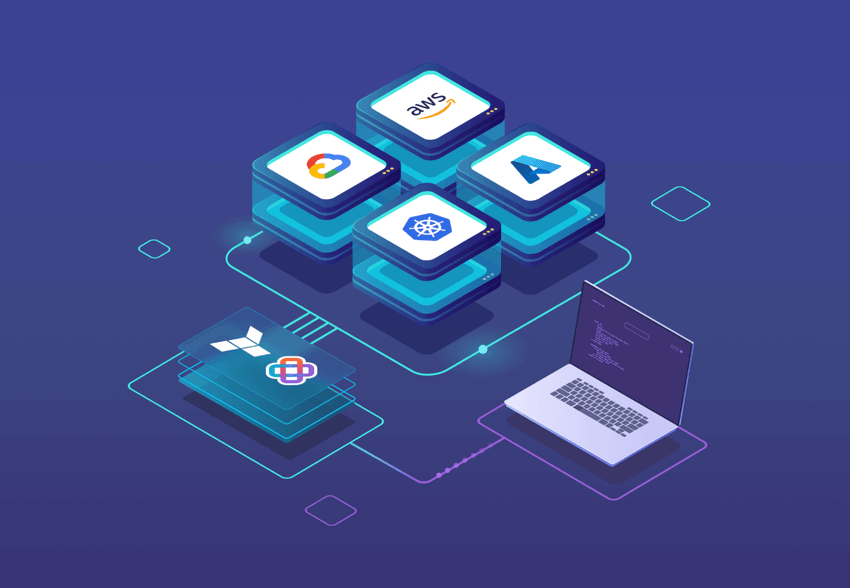
Machine Learning Workloads with Terraform Provider Iterative
The requirements for Machine Learning (ML) infrastructure are becoming increasingly complex. Training large models often requires specialized hardware (GPUs, TPUs) which involves moving the whole training process onto cloud machines, setting up environments and synchronizing data. For teams that want to leverage spot instances, the setup becomes even more complex — they need to make sure the training progress is not lost during spot instance recovery. This is time-consuming, and requires expertise in both DevOps and Machine Learning. Additionally, training in a cloud environment can incur high costs due to the need for expensive hardware, as well as users forgetting to shutdown instances when training is complete.
To address the specific needs of machine learning teams, we have built Terraform Provider Iterative (TPI). TPI is an open-source tool extending the functionality of Terraform, the world's most widely used multi-cloud provisioning product. The Iterative Provider enables full lifecycle management of computing resources and is designed specifically for machine learning pipelines.
Tailored to Machine Learning Workflows
The Iterative Provider offers a single resource called iterative_task which
you can use to configure:
- Your cloud infrastructure
- The steps to perform on the cloud resource, i.e. setting up the environment, running the training pipeline, logging metrics, etc.
- The data to be synced back once the training is complete (e.g. a file with metrics, a model, plots)
Here’s a “hello world” example of a main.tf Terraform configuration file using
the iterative_task resource:
terraform {
required_providers { iterative = { source = "iterative/iterative" } }
}
provider "iterative" {}
resource "iterative_task" "example" {
cloud = "aws" # or any of: gcp, az, k8s
machine = "m" # medium. Or any of: l, xl, m+k80, xl+v100, ...
image = "ubuntu" # or "nvidia", ...
region = "us-west" # or us-west, eu-east, ...
disk_size = 30 # GB
spot = 0 # auto-price. Default -1 to disable or >0 for hourly USD limit
timeout = 24*60*60 # max 24h before forced termination
storage {
workdir = "."
output = "results"
}
script = <<-END
#!/bin/bash
sudo apt update
sudo apt install -y python3-pip
pip3 install --user -r requirements.txt
python3 train.py
END
}Once the training is complete, the Iterative Provider terminates the resource, so users don't have to worry about spiraling costs from unused machines.
Configure Once, Bring Everywhere
Once you configure infrastructure and a script that executes your training pipeline in a Terraform configuration file, you can bring that pipeline anywhere you want. You can use such a config for ad-hoc training at any stage of your prototyping process or use it as a job in your preferred CI/CD tool. You can also store your infrastructure configuration files in a version control system together with the rest of your project for easier control.
One Provider to Rule Them All
Whether you prefer Amazon Web Services (AWS), Microsoft Azure, Google Cloud Platform (GCP), or Kubernetes (K8s), the Iterative Provider has you covered. You can configure compute resources from these with a unified API, using common machine types that are the same across all cloud vendors. This significantly simplifies infrastructure configuration and makes it easy to migrate from one cloud to another by changing just one line of code.
Costs Optimization
The Iterative Provider helps with cloud compute cost optimization in two major ways. First, upon completion of your script, the instance is automatically terminated. This helps to avoid accumulating costs due to abandoned resources. Second, you can leverage the cost-saving power of spot instances to train your models without losing any progress! TPI recovers the working directory and respawns interrupted/preempted instances for you.
DevOps-Friendly
Last, but not least, the Iterative Provider aims to bridge the gap between DevOps and Data Science teams. We build on top of Terraform, a tool universally familiar to DevOps teams, but extend it to suit ML needs.
If you’d like to try the Iterative Provider in your project, check out the documentation on the provider’s page in the Terraform registry, and if you have any questions or suggestions, we welcome them in our GitHub repository.
